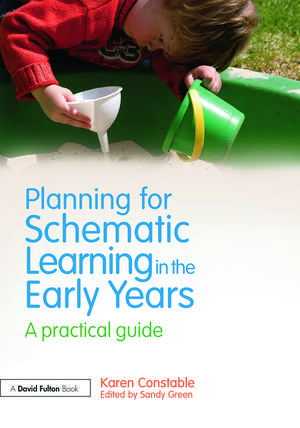Planning for Schematic Learning in the Early Years: A practical guide
Autor Karen Constable Editat de Sandy Greenen Limba Engleză Paperback – 24 mai 2013
All children are different, they look different, sound different, behave in different ways and crucially they learn differently. It is a constant challenge in Early Years settings and Reception classes to provide opportunities that are relevant and valuable for all the children. Being able to recognise and identify schemas in young children enables practitioners to plan a play-based curriculum that allows for individualised learning based around each child’s interests that will support the next steps of their development.
Drawing on current research, the book clearly explains what schemas are and how they can be identified in children. Looking at how settings can plan to incorporate schemas into their schemes and topics and providing real life examples of schematic learning in practice, features include:
- Examples of schemas alongside descriptions of common behaviour patterns
- A chapter on using schemas to support children with additional needs
- Photocopiable key checklists to help identify different schemas
- Guidance on developing schemas to support children in their next steps
- Advice on using schemas to aid the transition to Key Stage 1
Including case studies and photographs to illustrate practice, this highly practical book aims to inspire practitioners, teachers and students to be creative in the way they work with children and ensure the best for those in their care.
| Toate formatele și edițiile | Preț | Express |
|---|---|---|
| Paperback (1) | 182.15 lei 6-8 săpt. | |
| Taylor & Francis – 24 mai 2013 | 182.15 lei 6-8 săpt. | |
| Hardback (1) | 763.39 lei 6-8 săpt. | |
| Taylor & Francis – 22 mai 2013 | 763.39 lei 6-8 săpt. |
Preț: 182.15 lei
Preț vechi: 221.84 lei
-18% Nou
Puncte Express: 273
Preț estimativ în valută:
34.86€ • 35.70$ • 28.100£
34.86€ • 35.70$ • 28.100£
Carte tipărită la comandă
Livrare economică 19 martie-02 aprilie
Preluare comenzi: 021 569.72.76
Specificații
ISBN-13: 9780415697125
ISBN-10: 0415697123
Pagini: 152
Ilustrații: 32 black & white illustrations, 24 black & white tables, 32 black & white halftones
Dimensiuni: 174 x 246 x 10 mm
Greutate: 0.32 kg
Ediția:New.
Editura: Taylor & Francis
Colecția Routledge
Locul publicării:Oxford, United Kingdom
ISBN-10: 0415697123
Pagini: 152
Ilustrații: 32 black & white illustrations, 24 black & white tables, 32 black & white halftones
Dimensiuni: 174 x 246 x 10 mm
Greutate: 0.32 kg
Ediția:New.
Editura: Taylor & Francis
Colecția Routledge
Locul publicării:Oxford, United Kingdom
Public țintă
Professional, Professional Practice & Development, and UndergraduateCuprins
1. Children Learning through Play 2. Identifying Schematic Learning in Young Children 3. Children with Special Educational Needs and Schematic Learning 4. Case studies: Hudson The Connector, Ellie The Transporter, Jenson and the Trajectory Schema, Madison The Enveloper 5. Creating an Appropriate Curriculum 6. Rockets and Aliens 7. The Outdoor Classroom, All About Me, Towns and Cities, Transition 7. Conclusion
Descriere
All children are different, they look different, sound different, behave in different ways and crucially they learn differently. It is a constant challenge in Early Years settings and Reception classes to provide opportunities that are relevant and valuable for all the children in their care. Being able to recognise and identify schemas in young children enables practitioners to plan a play-based curriculum that allows for individualised learning based around each child’s interests that will support the next steps of their development.
Drawing on current research, the book clearly explains what schemas are and how they can be indentified in children. It then looks at how settings can plan to incorporate schemas into their schemes and topics and provides real life examples of schematic learning in practice.
Drawing on current research, the book clearly explains what schemas are and how they can be indentified in children. It then looks at how settings can plan to incorporate schemas into their schemes and topics and provides real life examples of schematic learning in practice.














